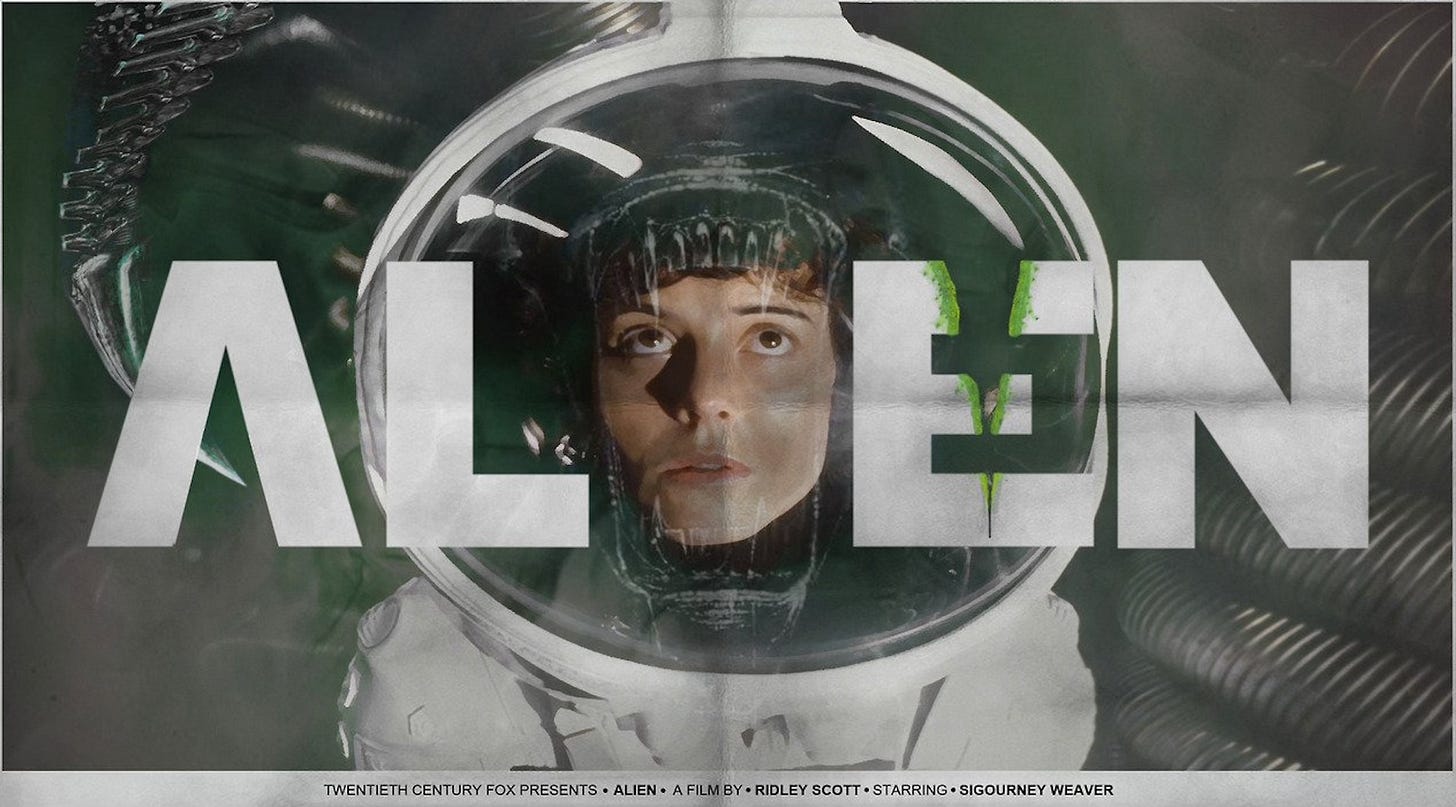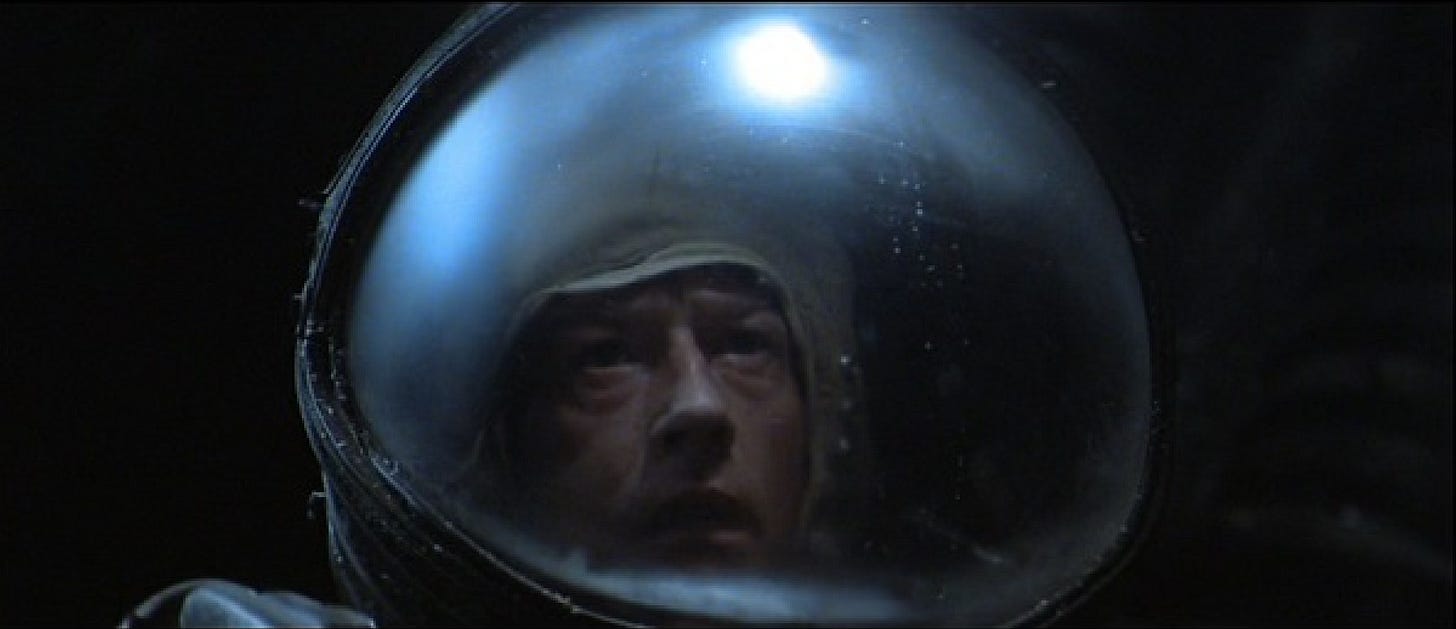Leviathan.
Why Alien is an arthouse movie.
There’s a not-so-silent divide between “genre” movies and those that appear to aim higher. This cannot make sense - “genre” isn’t something with an opposite. Of course when used to denote films that aren’t whatever the opposite of “genre” is, the word is really just standing in for “shit”. In this sense “genre” gives you what you want in the same way a Mars bar and a KFC might. These are art’s empty calories.
“Genre” has no opposite but “generic” does; so if I had to put a name to the opposite of genre movies then “ipseity” appeals because it’s the most pretentious word I can find for the idea of being individual and unique. “Distinction” is probably better though, meaning “unlike others” whilst also suggestive of a sense of quality. Certainly generic stories are those that follow rules and are diminished by them, whilst the others, the distinctive films, break the rules or at the very least flout conventions. Genre is easy and gives you what you want, distinction is harder to engage with and perhaps gives you what you need.
But art movies and indie movies all have conventions, have rules. They are themselves generic or at least are part of a genre. Like Oscar baiting dramas, art movies and indie films are just another subgenera of non-genre films, of distinctive cinema. Arthouse films are easy to recognise by their tropes. Slow takes. Sparse dialogue. Minimalism in all things, especially the strokes taken to bring the characters into being. Devotion to the importance of the image to the point of abstraction and obscurity. Arthouse cinema is intense, uncompromising, often hard to watch, either bleakly cold or frighteningly overwhelming. Alien is an art movie.
OK it’s an art movie that ends with Sigourney Weaver in her underwear firing a grapple gun into a space monster, but neither sex, violence or sexy violence are out of place in arthouse cinema. Extremes of both express a desire to break taboos and generally get in the audience’s face which is de rigueur when proving your distinctive creditionals.
True, it is unusual for arthouse cinema to birth so many sequels. We have yet to see “The Cook, The Thief, His Wife and Her Lover 2”, “Eraserhead vs Stalker” or “There Will Be MORE Blood” though I suspect we are frighteningly close to “Citizen Musk” with its haunting closing image of a burning sledge marked only by the letter X. Still, that something in the original concept of Alien injected itself directly into the bloodstream of popular culture does not diminish the original film. Sure, James Cameron’s Aliens is a sci-fi action movie in which a kick ass heroine rescues a child from monsters but Ridley Scott’s original film is an existential meditation on the threat of capitalism, it’s an art movie.
In an episode of his new podcast “Past, Present, Future” politics professor David Runciman recently set out his case that our current geological epoch has also been mislabelled. He suggests its unfair to call our age of human induced extinctions the “Anthropocene” since, without wishing to sound too much like a white guy in a feminist chat room, it’s not all humans who are really responsible for causing the environmental degradation we face. Blaming climate change on “human” behaviour elides a crucial fact that most the damage has been caused by a relatively small and fairly specific subgroup. To correct this category error other names for our era have been suggested but Runciman dissects and discards them all before offering his own alternative - the Leviacene.
Here he is, as ever, referencing the 17th century English philosopher Thomas Hobbes and his book Leviathan which describes the state, the body politic, as a monster that, though made up of people, rapidly develops an existence beyond them. Building on Hobbes, Runciman has long argued that states and also corporations are more than methods of organising human social groups. Crucially both have the ability to live far longer than any individual leader or thinker whose power they may have initially been created to project. Once founded states and corporations are inhuman, suprahuman, they are monsters. They protect us, they destroy us, they magnify our hunger and power yet also remove us from full responsibility. It is these non-human entities that have enabled, that continue to cause our hurtling, stumbling, tumbling descent towards a mass extinction event. So, not the Anthropocene, not all people, but the Leviacene, the destructive force of nation states and corporations keeping us alive whilst destroying us. There is no better expression of this idea than the film Alien.
It is not just the visceral portrayal of the relationship between parasite and host. It is easy to forget that the true antagonist of Scott’s film is not Gieger’s iconically horrific monster but the faceless Weyland-Yutani corporation, “The Company”, that, having decided it wants the creature, sets no store on the lives of the employees tasked with bringing it home. It may be the Alien that eats them, but it is the company that puts them on the menu. The alien is the monster they found, the Leviathan is the monster that took them to space. Deliberately or unconsciously Alien is presents a chilling portrait of how our own Leviathans will cause our end.
Of course Alien is not just an art movie. It is one of that rare class of films that talks to a wide audience, becomes a cultural commonplace, yet does so without sacrificing any of its stark intensity or rigour. These are films that stretch you but never forget to have fun too. I think of these distinctive-genre movies, the ones broadly rather than narrowly intellectual, art house with jazz hands, as a kind of Ginger Rodgers act of creation - to succeed they must do everything an auteur does but backwards and in heels.
Alien is also definitely not a piece of auteur filmmaking. Though most commonly associated with its director Ridley Scott, 20th Century Fox only brought him onto the project when Walter Hill turned it down for projects less heavy with effects. Hill’s production company Brandywine had bought the original script by Dan O’Bannon and Ronald Shusett and though the WGA gave sole writing credit to O’Bannon, Hill and David Giler revised it extensively and wrote the final shooting script. It’s also worth noting that Giger was not brought on to design the creature, rather his work directly inspired O’Bannon whilst he was living in Paris and working with Jodorowsky on his aborted adaptation of Dune. The film Alien is itself a type of Leviathan, an entity that exists beyond the scope of its many human authors. Each may have had their own creative intention for the work but the work itself, like all great works of art, has no real author except the audience.
Rendering our world substantially less habitable is an accident of the human progress made possible by our own inhuman leviathans. An accident we don’t yet know how to escape as, despite Elon’s dreams of a new world on Mars, we remain trapped on this planet increasingly aware that in space no one can hear you scream.




